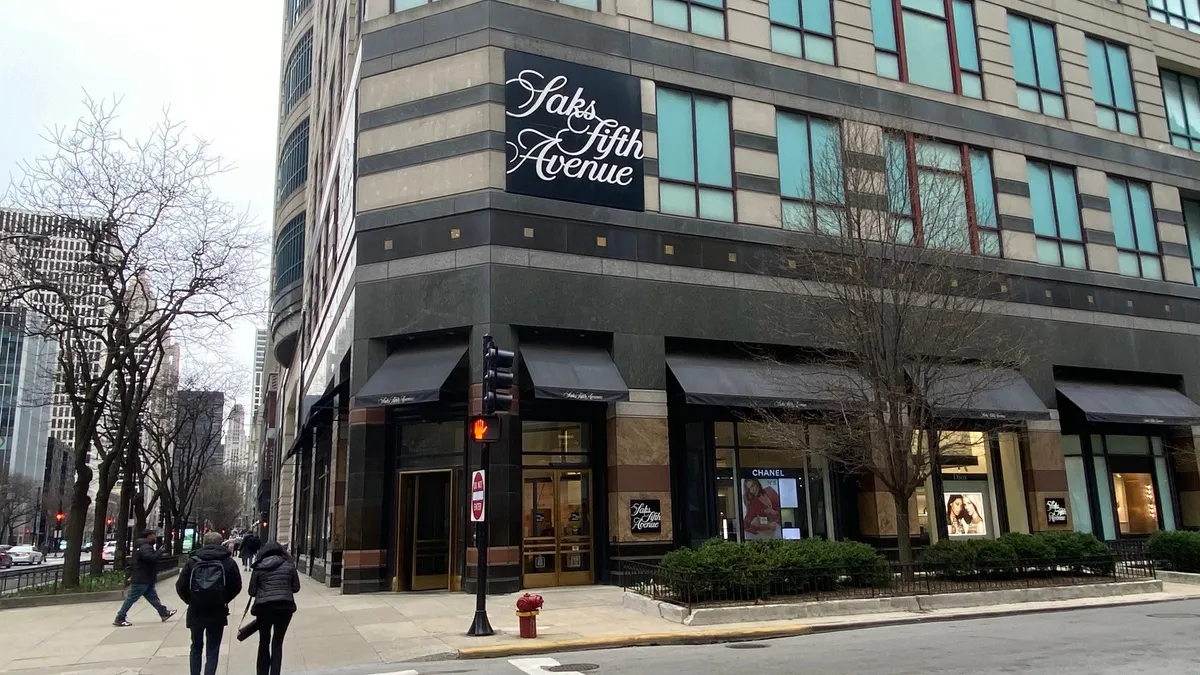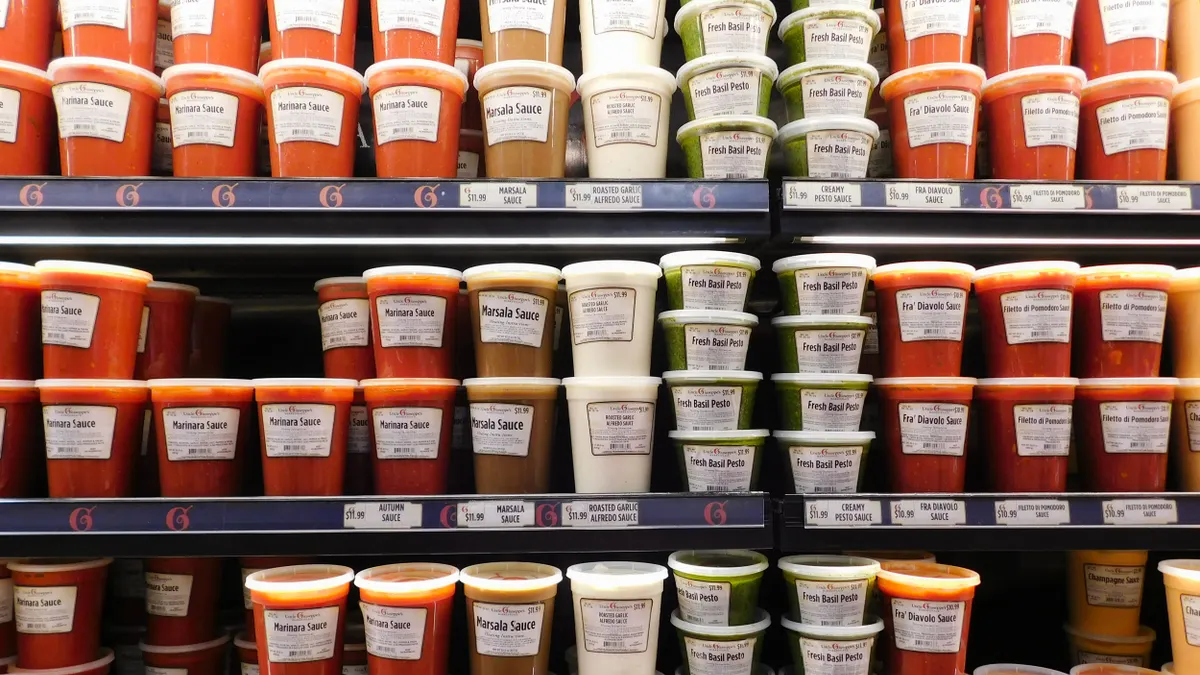Co-working is a rapidly expanding industry and it's not just changing workspaces, it's changing adjacent industries, including retail.
In October 2017, 8-year-old co-working company WeWork made a deal to buy Hudson’s Bay Fifth Avenue property Lord & Taylor flagship store for $850 million, raising not just eyebrows but red flags as to the future of both retail and office facilities. As companies such as WeWork, Co-Optim and NeueHouse pop up, it's prompting some to wonder if the changing nature of work is giving rise to a new kind of retail experience.
WeWork plans to turn the former Lord & Taylor space into its New York headquarters after the 2018 holiday season, with Lord & Taylor continuing to operate in the same building in a smaller capacity. The Hudson Bay/WeWork partnership will also include WeWork space on the upper floors of the Hudson’s Bay locations on Queen Street in Toronto and Granville Street in Vancouver in Canada, and in the Galleria Kaufhof in Frankfurt, Germany. It's part of what appears to be a larger retail push for WeWork, which declined to comment to Retail Dive for this story but has been rumored to be investing in several retail startup tech companies.
But buying up store space isn't the only retail push. Partnerships are another angle that WeWork — and other co-working companies — have been exploring in earnest. In February 2018, WeWork and LinkedIn announced a partnership with J. Crew that would include panel events, a new work-focus collection and campaign from J. Crew featuring WeWork members, and J. Crew pop-ups exclusively for WeWork members. The partnership comes at a particularly tense time for the J. Crew brand, which saw a 7% same-store sales drop in fourth quarter 2017 and plans to close as many as 20 additional stores in 2018, following the shuttering of 50 stores in 2017.
Certainly WeWork isn't the only co-working company exploring retail. Upscale co-working company NeueHouse, with locations in New York and Los Angeles, is also exploring its options.
"We think of ourselves as home of the new," said Jon Goss, chief commercial officer at NeueHouse, an upscale co-working space founded in 2011, with locations in New York and Los Angeles. "Retail is very much a part of that."
The company recently featured a pop-up shop in its New York location for Australian skincare brand Aesop, which is a NeueHouse member with studio space on the upper floor. "We're raising money right now, and looking to expand into more properties," said Goss. "And we talk about how NeueHouse fits as more than just a work space. Work is one of the spaces, and then culture, and then lifestyle. It's more than just a desk. And providing our customers with the ability to discover new products and experiences is part of that, and part of my vision for our customer experience."
NeueHouse has previously partnered with digital fashion retailer FarFetch, and they’ve just signed a deal with a new headphones brand that Goss declined to name. In addition, J. Crew chairman Mickey Drexler recently showed up to the New York location to talk to members about retail. Diane von Furstenberg was another a recent speaker. A recent visit to a WeWork facility in Chicago showed a pending pop-up with Oars + Alps, direct to consumer men's grooming products.
"We have to curate with the right partners," said Goss. "In our Hollywood location, we've renovated our lobby to be used, in part, as a popup retail space."
"All these digital-only brands are opening pop-up stores anyway. So maybe it makes sense to open one in the lobby of co-working space to capture consumers passing by and working."

Zoe Leavitt
Senior Retail Analyst, CB Insights
Another co-working space working with retail partners is upscale Chicago-based Co-Optim. Alicia Hutzler, Co-Optim's director of marketing and sales said its partnerships are about adding value for its members. To that end, the company in May began a partnership with Chanel and Bloomingdale's in Chicago, offering men's and women's fragrance and hand lotion to Co-Optim's co-working members.
"We are in a unique position, because our members don't pay for extras," said Hutzler. "Printing, office supplies, food and beverages are all included with the membership fee. And we're bringing in this additional value for members." Hutzler expects the partnership to last throughout the summer. "And then we'll see if it will be ongoing," she said. Co-Optim itself is also looking to expand from its three current Chicago spaces to other cities, including Los Angeles, Denver, Miami, Dallas, Seattle and New York, with the expansion rolling out to at least two more cities over the next two years, and the rest by 2020.
Other co-working retail partnerships include No. 18 and The Shops Buckhead Atlanta, which will bring upscale Stockholm-based co-working company No. 18 to Atlanta's high-end open-air shopping center in fall 2018, and Staples launched a partnership with co-working space Workbar in 2016. Brooklyn-based The Wing is a space for women only with four locations in New York City and one in Washington D.C. There are seven more locations "coming soon" in Chicago, London, Seattle, San Francisco, Toronto, West Hollywood and Williamsburg, Brooklyn and a retail component that sells on-brand merchandise such as key chains with empowering female-centric messages — complete with an online shop.
Spacious, another new concept functions like a pop-up shop, taking up short term residency in vacant storefronts and even Westfield Malls has its BeSpoke Coworking concept in its San Francisco Centre. Then there's Co Work at the Mall, a 15,000 square foot space inside the Water Tower Place mall in Chicago that is a hybird co-working co-retailing concept that pairs pop-up shop and events space with the shared workplace.
Experiential retail or captive consumer?
Yet despite retail's active entrance into the co-working space, some analysts are hesitant to lump this co-branding experiment in with new ideas in experiential retail.
"WeWork and others are not experiential retail," Michael Brown, a partner in the retail practice of management consultant A.T. Kearney, and author of the report The Future of Shopping Centers, told Retail Dive in an email. "They are, however, creatively leveraging available space to serve the new demographic of gig economy workers that need physical locations to work and collaborate with other workers in related fields. So it’s more a way to re-purpose underutilized or less productive store space."
"You have all these hardworking folks in co-working spaces, and if they just happen to see stuff, there's a good chance they're going to buy it. "

Healey Cypher
CEO, Zivelo
According to Healey Cypher, founder and CEO of Oak Labs, an interactive retail technology company recently acquired by Zlvelo (best known for its touchscreen technology), retail in co-working spaces is more about capturing the consumer's attention than creating an experience. "When Sports Authority went bankrupt, this consulting firm found that 15% of sales went to Dick's and 15% to Amazon," said Cypher, the currently Zivelo's CEO. "So what happened to the balance? The answer is that the sales disappeared. And it's because humans are simple: If we don't see it, we won't buy it."
Adding retail to co-working spaces solves at least part of that problem, said Cypher. "You have all these hardworking folks in co-working spaces, and if they just happen to see stuff, there's a good chance they're going to buy it. If you take a small format store and [a] captive population with guests coming by all the time, it's a really good idea."
Finding the right fit
The concept is particularly appealing for online brands looking to get their products in front of customers. "All these digital-only brands are opening pop-up stores anyway," said Zoe Leavitt, senior retail analyst at CB Insights, a data analytics platform. "So maybe it makes sense to open one in the lobby of co-working space to capture consumers passing by and working."
But not all retail will work in co-working spaces. "With J. Crew in New York, they need to diversify, so I'm not surprised to see them jumping on a collaboration with WeWork," said Syama Meagher, founder and chief retail strategist at retail consultancy Scaling Retail. "But if I were at WeWork, I would actually think about more lateral businesses," such as office or work-oriented products and brands.
WeWork, which is primarily geared toward tech startups, is more technology- than creatively-driven, and Meagher suggests the business might be better served by a retail collaboration more suited to its brand strategy. "Why not host an Apple popup shop," she said. "Or maybe a Google popup? Give members a discount on those products, and give people access to tools and products they might actively use."
Shared workspaces are hosting workshops aimed at bettering member's business or leadership skills, while makers of bespoke suits and work-appropriate apparel are making appearances on the chance that young workers will ditch the athleisure for new duds.
For Meager, adding retail to co-working spaces needs to be not just fun but also practical. "Doing a retail storefront inside a co-working space is somewhat detrimental to people working," she said. "So how are we helping the people in that space, and what is adding value? Is this adding value or is this just marketing?"
Meagher suggested that finding the best fit may mean looking outside of fashion categories. "As opposed to fashion retail, what if [a co-working space] partnered with SoulCycle or another gym?" said Meagher. "You have to satisfy what people need. Retail can be food, or exercise. There are different ways of selling products. But the first question is, 'What do customers need?' Giving them a t-shirt from J. Crew doesn't seem to be something that a consumer who's working all day needs. J. Crew is fun, but who actually made any money off of it?"
Leavitt agrees, noting that fitness and exercise classes such as WeWork's Rise by We program, will be important parts of the co-working and retailing partnership. "I also see household goods that you could pick up at the office and bring home, like pet food and cleaning supplies," said Leavitt. "But I see clothing coming last here."
Co-working, co-retailing and the retail integration
There may be even more to retail in a co-working space than simply adding a popup store or bringing in brand partnerships, according to Meagher, who envisions some spaces as making a transition from workspaces to full co-retailing spaces, where merchants share space inside a location, like a co-operative version of a mall.
"It would be no surprise if companies such as WeWork took some of their spaces and turned them into co-retailing spaces," said Meagher. "Co-retailing is a very similar business model, and I wouldn't be surprised if they're testing the waters to see how retail operates. I think makes more sense than the WeWork apartments. This co-retailing business model is cropping up all over the place, and it's actually an opportunity."
And for struggling malls, finding a way to integrate co-working and retail might be the solution to filling rapidly emptying storefronts.
"Mall operators such as GGP and Simon Property Group have built homes and hotels alongside their properties, and have also signed co-working space providers as tenants on less-productive floors of shopping malls," John Mercer, senior analyst, Coresight Research (formerly Fung Global Retail & Technology) told Retail Dive in an email, pointing to a recent report from his company titled Retail Real Estate M&As: A Sign of Renewed Investor Confidence in US Retail?
Challenges and pitfalls
Yet adding retail to co-working spaces brings certain problems.
"There are a couple big challenges I see," Christopher Walton, an independent consultant and former vice president of Target Store of the Future, told Retail Dive in an email. "One, it is hard to coordinate retail partnerships at scale in such a way that the retail experiences will stay fresh and well executed across the country."
"Two, it will also be difficult for retailers to generate the return on the investment required from the partnerships or the product placement. It is similar, in my mind, to the phenomenon of retail at airports. Some money can be made at airport stores, but those stores don’t really blow the doors off for any retailer," he said.
Making retail work financially may be particularly important for WeWork, which owes $18 billion in rent despite having secured just over $700 million in a recent round of junk bond financing. Analysts are unsure whether the retail element is a practical measure economically — not just for WeWork, but for the co-working industry as a whole, which may be in a bubble that's about to burst.
"We are somewhat skeptical about the opportunities to bring retail into co-working spaces," said Mercer. "We do not see an organic fit, unless the retail element is something such as a coffee shop, though, even then, that will be competing with WeWork's free refreshment offering, which can range from coffee to beer. Many individuals and employers may not want the distraction of a retail element in their workspace, particularly if they are paying a premium for that space."
What's next (and where is Amazon in all of this)?
Moving forward, there may be opportunities for digital retail brands to beat co-working spaces at their own game by opening up co-working spaces of their own, much like retailers have begun opening hotels.
"A lot of brands are really trying to crack the brick and mortar to mobile conversation. So the notion of someone like MM.LaFleur creating a co-working space is intriguing."

Syama Meagher,
Founder and Chief Retail Strategist, Scaling Retail
"A lot of brands are really trying to crack the brick and mortar to mobile conversation," said Meager. "So the notion of someone like MM.LaFleur creating a co-working space is intriguing." Meager also sees room for companies such as Apple and, who else, Amazon to try co-working and pointed to the new Apple concept store in Chicago as a possible starting point.
"It's meant to have talks and be a community hub," she said. "Formalizing that into a working space would, transitionally, make a lot sense. And Amazon being able to tap into its network of resources is a huge advantage. If you think all the way through to shipping and fulfillment, plus they own Whole Foods, co-working could be a brand extension for them, and a way of making the brand even more indispensable."
Additional reporting by Laura Heller























